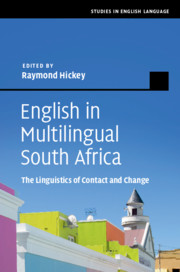Refine search
Actions for selected content:
5 results
1 - Introduction
-
- Book:
- The Sounds of English Around the World
- Published online:
- 25 August 2023
- Print publication:
- 14 September 2023, pp 1-13
-
- Chapter
- Export citation
1 - Glocalization and Grobalization: Critical Issues in English Language Teaching and Teacher Education in East Asia
-
-
- Book:
- English Language Teaching and Teacher Education in East Asia
- Published online:
- 17 October 2020
- Print publication:
- 05 November 2020, pp 1-36
-
- Chapter
- Export citation
27 - The Politics of World Englishes
- from Part IV - Current Challenges
-
-
- Book:
- The Cambridge Handbook of World Englishes
- Published online:
- 16 December 2019
- Print publication:
- 02 January 2020, pp 633-651
-
- Chapter
- Export citation

English as a Lingua Franca
- The Pragmatic Perspective
-
- Published online:
- 18 November 2019
- Print publication:
- 28 November 2019

English in Multilingual South Africa
- The Linguistics of Contact and Change
-
- Published online:
- 07 November 2019
- Print publication:
- 21 November 2019
